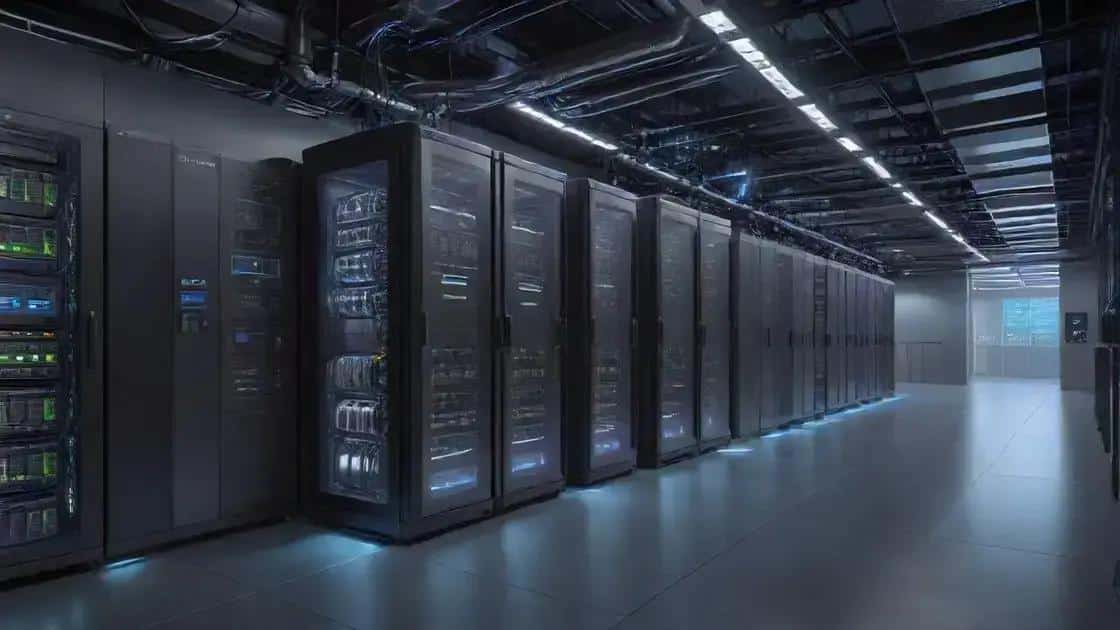Insights on data center efficiency news that matter

Data center efficiency news highlights the significance of adopting AI, automation, edge computing, and sustainable practices to optimize operations and enhance performance in response to growing digital demands.
Insights on data center efficiency news play a crucial role in optimizing operations. As companies strive for improved performance, these insights provide valuable guidance. Ready to dive into the latest trends?
Understanding data center efficiency metrics
Understanding data center efficiency metrics is crucial for organizations looking to enhance their operations. By comprehensively analyzing these metrics, you can make informed decisions that boost performance and reduce costs.
Key Metrics to Consider
Data centers rely on several metrics to determine their efficiency. Some of the most important include:
- Power Usage Effectiveness (PUE): This metric measures how efficiently a data center uses energy. The lower the PUE, the more efficient the data center is.
- Data Center Infrastructure Efficiency (DCIE): The DCIE is the inverse of PUE, indicating the percentage of energy used by the IT equipment itself.
- Server Utilization: Monitoring how effectively servers operate ensures resources are being maximized.
- Annualized Failure Rate (AFR): Understanding system dependability helps mitigate risks related to hardware failures.
By focusing on these metrics, data center managers can identify areas for improvement. Maintaining a consistent assessment of these factors enhances operational effectiveness and supports long-term sustainability goals.
Improving Efficiency with Best Practices
Implementing best practices is vital for improving data center efficiency. Techniques such as virtualization can significantly optimize resource usage. Additionally, regular maintenance schedules and updates can prevent inefficiencies from arising.
Another important approach is the use of advanced cooling techniques. By investing in efficient cooling technologies, data centers can minimize energy waste and maintain optimal temperatures.
Taking a proactive stance on monitoring and analytics further ensures that your data center operates at peak efficiency. Solutions that provide real-time data enable quick adjustments to be made, reducing downtime and elevating performance.
Ultimately, the goal is to create an adaptable environment that can respond to evolving demands while maximizing efficiency. This balance is key to operating a successful, sustainable data center.
Innovative technologies improving data center performance

Innovative technologies are essential for improving data center performance. As the demand for digital services rises, embracing cutting-edge solutions becomes crucial.
Virtualization and Cloud Computing
Virtualization allows organizations to run multiple virtual machines on a single physical server. This maximizes resource utilization and reduces energy consumption. Cloud computing extends this idea, offering scalable solutions that enhance efficiency while minimizing hardware costs.
- Dynamic resource allocation adapts to workload changes.
- Improved disaster recovery options with cloud backups.
- Access to advanced tools without hefty investments in hardware.
By leveraging these technologies, data centers can achieve optimal operational efficiency.
Artificial Intelligence and Machine Learning
The integration of artificial intelligence (AI) in data centers is transforming how they operate. AI helps predict server loads and automates routine maintenance tasks. Furthermore, machine learning algorithms analyze performance data, identifying patterns that lead to improved decision-making.
As AI continuously learns from data center operations, it optimizes workflows, ultimately leading to reduced operational costs and enhanced performance.
Another exciting development is the use of edge computing. This technology processes data closer to its source, significantly reducing latency. It allows organizations to respond more quickly to real-time data needs while optimizing bandwidth use.
Implementing innovative cooling solutions also plays a vital role in enhancing data center performance. Techniques such as liquid cooling and AI-powered cooling systems improve energy efficiency while maintaining optimal temperatures for equipment.
Adopting these advanced technologies not only addresses current performance challenges but also positions data centers for future growth. As innovation continues, staying ahead of the curve will ensure sustainable operations and long-term success.
Strategies for achieving sustainability in data centers
Achieving sustainability in data centers is a pressing goal for many organizations. As environmental awareness grows, adopting eco-friendly practices becomes essential.
Energy Efficiency Practices
One of the primary strategies is implementing energy efficiency practices. By optimizing power usage, data centers can significantly reduce their carbon footprint. Utilizing efficient hardware and software can lead to substantial energy savings.
- Invest in energy-efficient servers and cooling systems.
- Utilize renewable energy sources such as solar or wind.
- Implement advanced cooling solutions, like liquid cooling or free cooling.
These changes not only enhance sustainability but also lead to cost savings over time.
Virtualization and Cloud Solutions
Virtualization is a key strategy in promoting sustainability. It allows multiple virtual machines to run on single physical hardware, which effectively reduces the number of servers needed. This decreases overall energy consumption and minimizes waste. Cloud computing services also support sustainability by allowing organizations to use resources only as needed.
By migrating to the cloud, companies can scale their operations while minimizing physical infrastructure.
Another vital aspect is waste management. Properly recycling old equipment not only reduces landfill contributions but also allows for recovery and reuse of materials, creating a more circular economy within the tech industry. Regular audits on e-waste can help track and improve waste reduction efforts.
Adopting sustainability metrics within the organization facilitates continuous improvement. These metrics can include energy consumption rates, carbon emissions data, and overall operational efficiencies. By monitoring these factors, data centers can make informed decisions on enhancing their sustainability initiatives.
Incorporating these strategies into everyday operations leads to a more sustainable data center. As technology evolves, ongoing adaptation and implementation of sustainable practices will ensure that data centers meet modern environmental and operational demands.
Future trends in data center management

Future trends in data center management are shaping the landscape of technology and operations. As the demand for efficiency increases, data centers must stay ahead through innovative practices.
Adoption of AI and Automation
One significant trend is the increased reliance on artificial intelligence (AI) and automation. AI technologies help in predictive maintenance by analyzing performance data, allowing for timely interventions before failures occur. Automation improves operational efficiency by reducing manual tasks, thereby freeing up staff for more strategic roles.
- Automated monitoring systems track resource usage in real-time.
- AI algorithms enhance data analysis for better decision-making.
- Robotic process automation simplifies routine operations, reducing costs.
These advancements lead to increased uptime and lower operational costs.
Edge Computing Growth
Another noteworthy trend is the rise of edge computing. By processing data closer to its source, edge computing reduces latency and bandwidth usage. This is especially important for applications like IoT devices, where quick data processing is critical.
Businesses are shifting towards decentralized data centers to handle localized data more efficiently. This approach not only improves performance but also enhances data security by minimizing the distance information travels.
Emphasizing sustainability is also becoming a critical focus in future data center management. Organizations are expected to prioritize eco-friendly practices, such as utilizing renewable energy sources and improving energy efficiency. Metrics for measuring sustainability will likely become a standard part of operational strategies.
In addition, as cyber threats evolve, enhancing cybersecurity measures will be vital. Future data centers must adopt robust security protocols and invest in innovative technologies to protect sensitive information. This includes advanced encryption methods and continuous monitoring systems to detect security breaches swiftly.
Overall, the future of data center management will be driven by automation, edge computing, sustainability, and enhanced security measures. Staying informed about these trends will be critical for organizations aiming to maintain a competitive edge in the rapidly evolving tech landscape.
FAQ – Frequently Asked Questions about Data Center Management
What role does AI play in data center management?
AI helps predict failures and automate routine tasks, enhancing efficiency and reducing operational costs.
How does edge computing improve data processing?
Edge computing processes data closer to its source, which reduces latency and optimizes bandwidth usage.
What are some sustainable practices for data centers?
Sustainable practices include using renewable energy sources, efficient cooling solutions, and proper waste management.
Why is cybersecurity important for data centers?
Cybersecurity protects sensitive information from threats and ensures the integrity and confidentiality of data.





